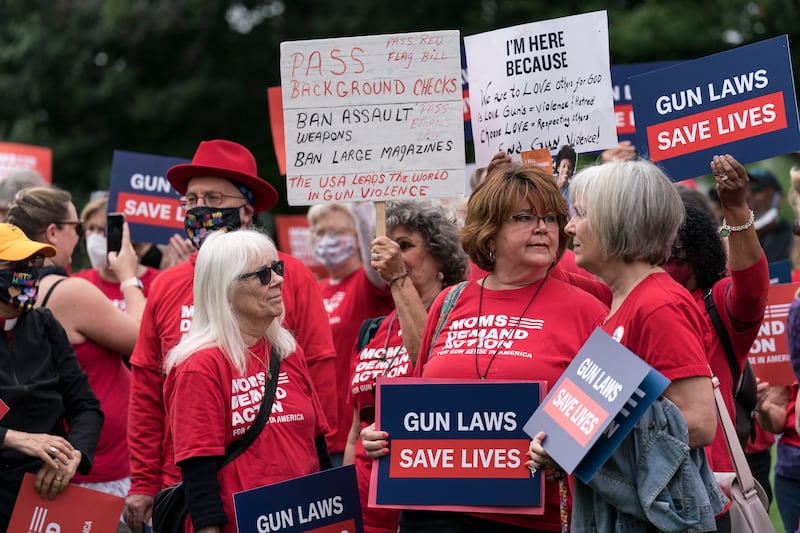Since the deadly shooting at Robb Elementary in Uvalde, Texas, lawmakers have discussed a number of gun safety proposals. To actually get anything passed and to the president’s desk, though, would require the bipartisan support of Democrats and at least 10 Senate Republicans.
President Joe Biden thinks bipartisan solutions are possible, telling reporters at the White House Monday he thinks many Republicans recognize “we can’t continue like this.”
“I think things have gotten so bad that everybody is getting more rational about it,” Biden said. “At least that’s my hope and prayer.”
There were 249 shootings on U.S. school grounds last year, according to K-12 School Shooting Data, a database at the U.S. Naval Postgraduate School. That’s the highest figure since data is available back to 1970, according to the database, which tracks every instance a gun is brandished or fired or a bullet hits school property for any reason.
Here are some reforms Republicans are publicly discussing that they think could muster enough support in Congress to get passed:
Raise the minimum age to purchase a firearm to 21
Some Republicans believe the age limit to purchase a firearm should increase from 18 to 21.
“I think that raising the age of gun purchase to 21 is a no-brainer,” Rep. Adam Kinzinger said in an interview with ABC’s “This Week” Sunday.
Kinzinger pointed out that shootings in Uvalde, Buffalo, N.Y., and Parkland, Fla., were carried out by gunmen under the age of 21, and that there is recent precedent for raising the minimum age when it comes to tobacco. The new minimum age to purchase tobacco products was raised to 21 in 2019 and signe
d by then-President Donald Trump.
“We know that the human brain develops and matures a lot between the age of 18 and 21,” Kinzinger said. “We just raised — without really so much as a blink — the age of purchasing cigarettes.”
Arkansas Gov. Asa Hutchinson said during an interview on CBS News’ “Face the Nation” Sunday that while some states have raised their minimum age, including California and Florida, the 9th U.S. Circuit Court of Appeals ruled California’s 21-year-old age limit was unconstitutional in May.
“There are some constitutional challenges to that,” Hutchinson said. On CNN’s “New Day” Tuesday, Hutchinson said “you have to at least have a conversation” about the 18- vs. 21-year-old age limit.
Raising the minimum age to purchase firearms is also associated with a decline in firearm suicides among young people, according to a 2004 study by researchers at the Johns Hopkins Bloomberg School of Public Health, University of Pennsylvania, Philadelphia, Center for the Prevention of Youth Violence and Center for Gun Policy and Research.
Expand background checks
Sen. Mitt Romney, R-Utah, told reporters last Wednesday that background checks and updating background check technology is “something that I think is an appropriate federal responsibility.”
Romney said he’s open to looking at bipartisan gun safety legislation introduced in 2013 by Sen. Joe Manchin, D-W.V., and Sen. Pat Toomey, R-Pa., that would have expanded background checks.
Toomey reintroduced gun safety legislation in March, with backing from Republicans including Sen. John Cornyn of Texas, Sen. Marco Rubio of Florida and Sen. James Lankford of Oklahoma. Toomey told reporters last week he remains committed to passing bipartisan reforms, and that expanding background checks to cover all commercial sales was “one of the few” issues that had bipartisan support.
An April 2021 Pew Research Survey poll found 81% of U.S. adults support making private gun sales and sales at gun shows subject to background checks, higher than any other solution except for preventing people with mental illnesses from purchasing guns, at 87%.
Encourage states to pass their own red flag laws
A number of key Senate Republicans have signaled they are at least open to discussing red flag laws, including Cornyn and Romney.
Red flag laws allow courts to be petitioned to temporarily seize firearms from people believed to be a threat to themselves or others and temporarily bar them from purchasing firearms. Laws vary by state, but petitions can be allowed by people including law enforcement, family or household members, medical professionals, school officials, or current or former partners, according to Pew Charitable Trust’s Stateline.
Eighteen states have red flag laws, including California, Florida and Nevada, and 14 of the 18 states have passed them since the 2018 Parkland shooting, Stateline found.
Sen. Roy Blunt, R-Mo., told Politico he believes red flag laws “probably [have] the most potential” of passing, and Romney and Sen. Thom Tillis, R-N.C., both suggested states could be encouraged by the federal government to create their own red flag laws, as opposed to a federally mandated red flag law.


